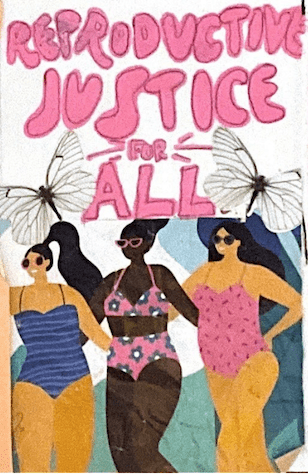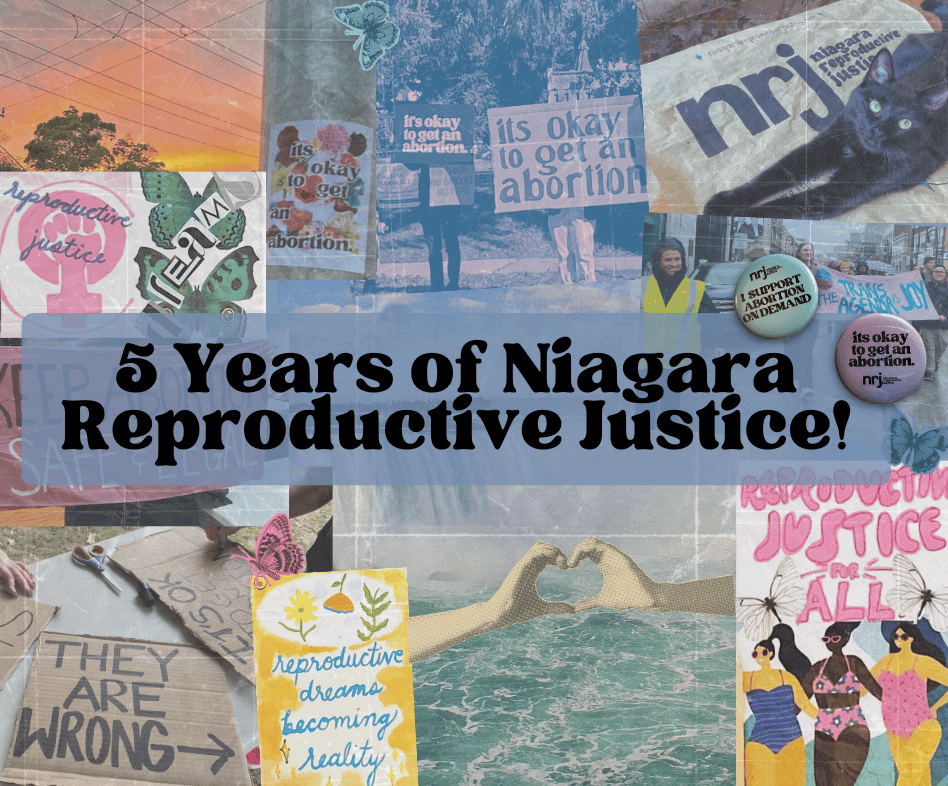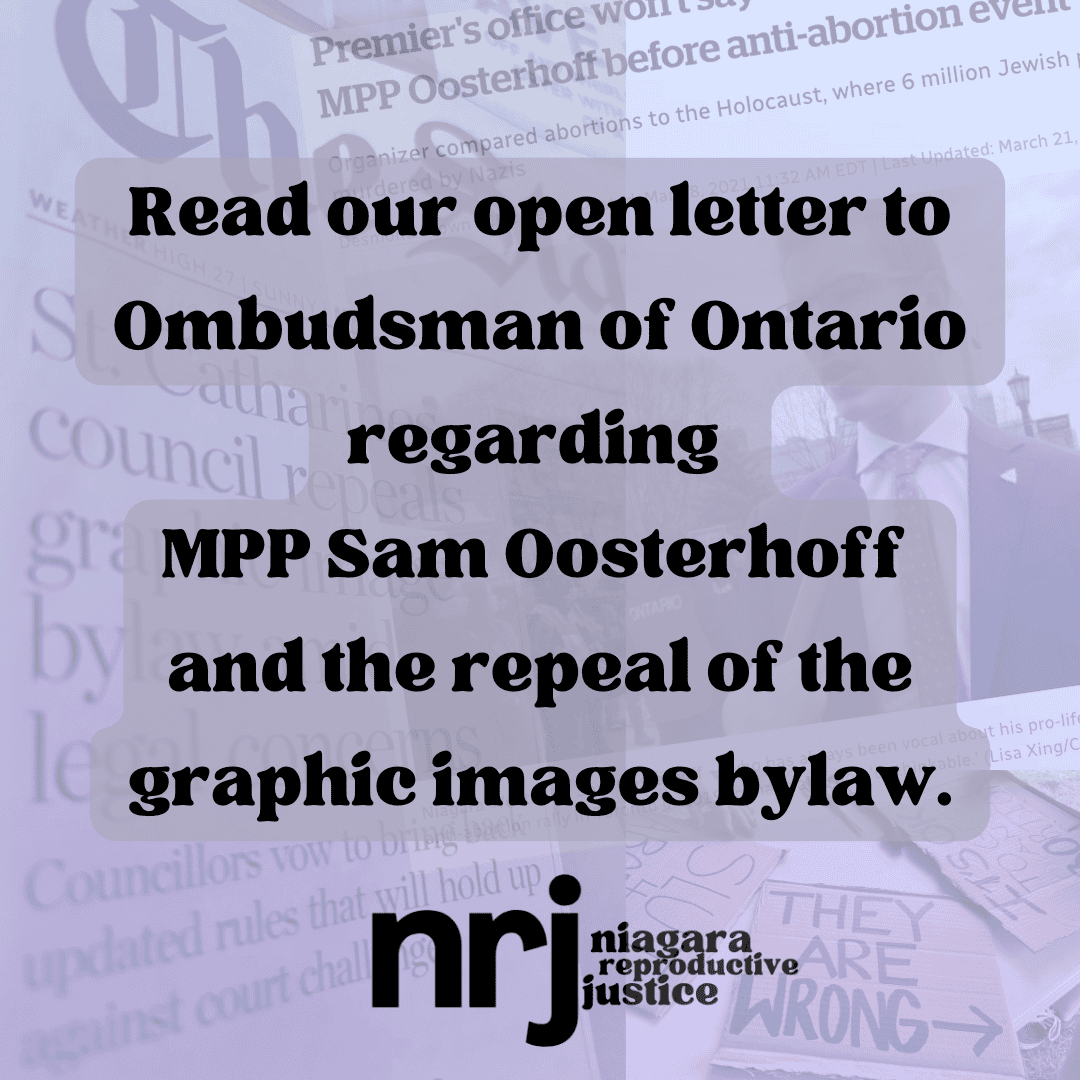About Us
Niagara Reproductive Justice (NRJ) is a group of community members in the Niagara Region of Ontario advocating for increased visibility of and access to sexual health resources in Niagara.
We are an action group of OPIRG Brock, a social, economic, and environmental justice organization based in St. Catharines, Ontario.
JOIN US! We are always welcoming new members and volunteers. If you’re interested in getting involved, or if you have a skill or idea you think could be put to use, let us know!
Contact NRJ
General inquiries:
Volunteering:
Abortion Support:

What We Do:
Abortion & Reproductive Support Network
We can offer transportation, financial support, and logistical support for folks in Niagara in need of assistance accessing abortion.
Niagara Resources and Community Knowledge Sharing
We maintain a database of low cost/free resources in Niagara. We also have some surveys for community members in Niagara to share their experience with abortion and other sexual + reproductive healthcare.
Monitoring Anti-Choice Activity in Niagara
We maintain a list of all of the known anti-choice (anti-abortion) organizations in the area and have a reporting form to keep track of their activity. We also have created some useful pro-choice guides and resources and run a rapid response network.
Our Values
NRJ operates under a mutual aid framework.
All activism begins with Indigenous solidarity.
Solidarity with Indigenous resistance and decolonization is central to reproductive justice. The Niagara Region has been, and continues to be, a site of colonization, and remains the home of the Haudenosaunee, Anishinaabeg, Wendat, and Chonnonton nations who have taken care of this land for time immemorial. As reproductive justice advocates, NRJ must prioritize issues faced by Indigenous peoples in all our work.
Sex work is real work.
NRJ calls for the full decriminalization of sex work as well as rights, safety, and respect for all sex workers. All types of labour under capitalism, including sex work, is the selling of one’s skills, knowledge and body. The reproductive justice movement has always relied on sex worker leadership and NRJ is committed to supporting sex workers as we all fight for bodily autonomy from the state.
Black Lives Matter, Black Trans Lives Matter.
Black people, especially Black trans women, face high rates of violence, discrimination, poverty, and experience additional obstacles to accessing sexual health services in Canada. The reproductive justice movement was started by Black women in 1994 to defend the needs of women of colour and to provide a framework for building a world where everyone has access to the resources they need in order to decide when, if, and how to have and raise children with dignity. NRJ seeks to uphold the anti-racist and revolutionary values of the original founders of the movement.
We believe that being pro-choice is not enough.
In order to make choices about your body and your life, you need to have access to the resources you need to make those choices – such as access to healthcare, transportation, money, and a support system. We also need to make sure that, as well as having access to abortion, everyone has the right to have children under the conditions they want to have them, and to raise them in a safe and healthy environment. This means that reproductive justice is deeply connected to other forms of justice, including decolonization, racial justice, prison and police abolition, immigrant justice, environmental justice, economic justice, disability justice, among many others.
We believe in a world where all people have control over their own bodies.
This includes the ability to safely self-prescribe abortion, estrogen, testosterone, and birth control, and freedom from state control over reproduction such as forced sterilization, coerced substance use treatment, incarceration, unjust intervention by the child welfare system, and an end to the forced assimilation and cultural genocide committed against Indigenous families.
We believe in the abolition of prisons and policing.
Regional and national police and military forces, which exist to protect the property of the white wealthy class and maintain class and racial divisions, pose one of the greatest dangers to bodily autonomy. Likewise, prisons are sites of extreme gendered and racialized violence, including sexual violence and denial of healthcare, and are part of the colonial eugenics project. Policing and prisons are incompatible with reproductive justice.
We do not believe in gender policing.
This includes any form of transmedicalism, trans-exclusionary radical feminism, or transphobia. “Biological sex” and gender are both social constructs that should be abolished.
All of our work must be informed by, and help achieve, disability justice.
People with disabilities have always been, and remain, a target of state reproductive violence and control. Similarly, the anti-choice movement has a long history of tokenizing and perpetuating harm against disabled people. It is our job to combat those narratives in all of our work. As an organization we strive to resist ableism in all forms and work towards making our events, meetings, materials, and resources accessible to all.
All of our work must be informed by, and help achieve, fat liberation.
Fatphobia is pervasive within healthcare and prevents people from accessing the healthcare that they want and need, including sexual healthcare and pregnancy support. Fatphobia within the medical system continues to harm and kill individuals. This means that reproductive justice is inextricably tied to fat liberation, where everyone’s ability to participate in society–including access to adequate and affirming sexual and reproductive healthcare–is not determined by their size or ability.
We believe in a harm reduction approach to substance use.
We support the legalization of all substances and access to safer supply. We strive to make our organization, events, and campaigns accessible and safe for people who use substances.
We support the safety and voices of survivors of violence.
This includes, but is not limited to, intimate partner violence, gender-based violence, and state violence. Practically, this means we take measures to protect the privacy of people who reach out to us for support, adding a quick exit to our website, and adding content warnings to potentially triggering social media posts. On a bigger scale, this means we support issues which will help end gender-based violence and support survivors, such as prison and police abolition, economic justice, housing for all, and other human rights solutions.
NRJ is a collective of people.
As such we are non-hierarchical and invested in a culture of calling one another in and self education. We also respect that sometimes calling out, rather than calling in, is necessary to create a safe and accountable space.
We are an Action Group of OPIRG Brock.
As such, we follow OPIRG Brock’s Safer Space Policy and procedures in the case of violations of the Safer Space Policy by any members or volunteers. You can access OPIRG Brock’s Safer Space Policy here. For more important policy documents, visit OPIRG Brock’s website at www.opirgbrock.com/important-documents.
As an addition to this policy, NRJ does not engage in debates via social media. Harmful comments on our posts will be deleted and, when appropriate, the person will be sent a private message informing them of our policy and directing them to additional resources. Should the person continue to post harmful comments, they will be blocked from our account..O
Reproductive Justice
Reproductive justice is a concept formalized by a coalition of 12 Black women in Chicago in 1994. They first formed the group “Women of African Descent for Reproductive Justice” in response to the inadequecies and racism of the pro-choice movement. The pro-choice movement largely did not capture the history of racialized reproductive oppression nor did it provide a roadmap for addressing and healing from these injustices. As Martha Paynter points out in her recent book, the emphasis on choice “skips over the problem of not having options. The rhetoric of choice is individualistic, but available options are the products of broad social contexts and systemic structure of inequality” (Abortion to Abolition, 2022, Paynter, p. 11). Therefore, the Chicago group sought to create a new movement, built off of the centuries of radical work and resistance of Black people, Indigenous people, melanated and racialized people, immigrants, trans people, queer people, and disabled people and they called it Reproductive Justice. Many of the original founders of this group went onto found SisterSong: Women of Color Reproductive Justice Collective.
Reproductive Justice, as defined by SisterSong, has three core tenets:
- The right to have an abortion
- The right to have children under the conditions you want to have them
- The right to raise your children in a safe and healthy environment.
For more information about reproductive justice, please visit SisterSong’s website.
Our History
Niagara Reproductive Justice was started in the summer of 2019 to respond to the growing anti-abortion movement in Niagara. We became an OPIRG Brock Action Group, and it was OPIRG that provided us with the initial support, resources, training, materials, and funding to get off the ground, and continue to provide us essential support today. Positive Living Niagara was also instrumental in our early days (and still is!), allowing us to use their meeting space and providing us with opportunities to network and reach wider audiences. We focused primarily on social media campaigns and community crafting events (“craftivism”).
We were still just getting our feet off the ground when the pandemic hit in early 2020. Since then, we have slowly been rebuilding and have added new branches to our collective. We now have two main focuses: Monitoring Anti-Choicers and Practical Abortion Support Services.
Our Monitoring Anti-Choicers team administers the Rapid Response Network (RRN), which is a network of volunteers who respond to anti-choice activity in Niagara in real time. Our goal is to reduce the presence of anti-abortion activity, such as protests, billboards, and events, in Niagara and counter the misinformation they spread about abortion.
Our Abortion & Reproductive Support Network (ARSN) provides on-the-ground support for people accessing abortion in Niagara, such as transportation, funding, and care coordination through a network of trained volunteers.
When we can, we still host our “craftivism” meetups, public webinars and trainings, and collaborate on community events such as the Niagara-on-the-Lake Public Library speakers series “Titillating Talks,” and the Niagara Free Store. We also produce posters, zines, buttons, and informational materials that we put on our website here for free and public use.
NRJ operates under a mutual aid framework. Oppressive systems – such as capitalism – create the conditions for poverty to exist. Mutual aid works to foster community resilience by encouraging people to support each other through voluntary cooperation, solidarity, and shared resources in times of need. We are non-hierarchical and do not have a formal leadership structure.
Check us out on Instagram and Facebook to stay in touch with what’s going on, and sign up for our quarterly newsletter!



